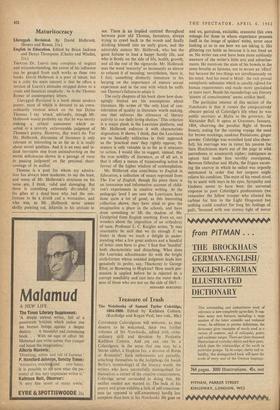Maturitocracy
Llareggub Revisited. By David Holbrook. (Bowes and Bowes, 21s.) English in Education. Edited by Brian Jackson
THOUGH Dr. Leavis may complain of neglect and misunderstanding, the extent of his influence can be gauged from such works as these two books. David Holbrook is a poet of talent; but as a critic his main interest is that he offers a version of Leavis's attitudes stripped down to a crude and fanatical simplicity : he is the Thomas Rymer of contemporary letters.
Llareggub Revisited is a book about modern poetry, most of which is devoted to an extra- ordinarily virulent attack on the late Dylan Thomas. I say 'attack', advisedly, though Mr. Holbrook would probably say that he was merely making a critical assessment which re- sulted in a severely unfavourable judgment of Thomas's poetry. However, this won't do. For Mr. Holbrook, discussion of literature is only relevant or interesting in so far as it is really about moral qualities. And it is an easy and in- deed inevitable step from animadverting on the moral deficiencies shown in a passage of verse to passing judgment on the personal short- comings of its author.
Thomas is a poet for whom my admira- tion has always been moderate, to say the least, and many of Mr. Holbrook's strictures on his verse are, I think, valid and damaging. But there is something extremely distasteful in his gibes at a dead *Ian who had the mis- fortune to be a drunk and a womaniser, and who was, as Mr Holbrook never ceases shrilly pointing out, infantile in his attitude to
sex. There is an implied contrast throughout between poor old Thomas, immature, always
trying to crawl back to the womb and finally drinking himself into an early grave, and the admirably mature Mr. Holbrook, who has the good fortune to lead a happy family life, and who is firmly on the side of life, health, growth, and all the rest of the rigmarole. Mr. Holbrook uses the word 'maturity' so incessantly as almost to exhaust it of meaning; nevertheless, there is, I feel, something distinctly immature in his harping on the importance of mature sexual experience and in the zest with which he sniffs out Thomas's failures to attain it.
The early chapters of his book show how dam- agingly limited are his assumptions about literature. He writes of 'the only kind of con- sideration of quality in literature worth making, one that enforces the relevance of literary activity to our daily living choices.' This criterion is a major plank in the Leavisian platform, and Mr. Holbrook enforces it with characteristic dogmatism. It shows, I think, that the Leavisians are as basically utilitarian in their approach as the 'practical men' they rightly oppose; lit- erature is only valuable in so far as it ministers to action. I would like to suggest, instead, that the true nobility of literature, as of all art, is that it offers a means of transcending action in
favour of the higher wisdom of contemplation. Mr. Holbrook also contributes to English in. Education, a collection of essays reprinted from The Use of English, though his piece there is
an innocuous and informative account of child- ren's experiments in creative writing. At the pedagogic level I am sure the Leavisians have done quite a lot of good; as this interesting collection shows, they have tried to give the imagination a place in the schools, and have done something to lift the shadow of Mr Gradgrind from English teaching. Even so, one wonders about the imposition of an orthodoxy of taste. Professor L. C. Knights writes, 'It may reasonably be said that we do enough if we foster in those we teach a delight in under- standing what a few great authors and a handful of lesser ones have to give.' I find that 'handful' both characteristic and disturbing. What does the Leavisian schoolmaster do with the bright sixth-former whose unaided judgment leads him genuinely to prefer, say, Thackeray to George Eliot, or Browning to Hopkins? How much per- suasion is applied before he is rejected as a corrupt sensibility and cast into the outer dark- ness of those who are not on the side of life?
BERNARD BERGONZI


































 Previous page
Previous page